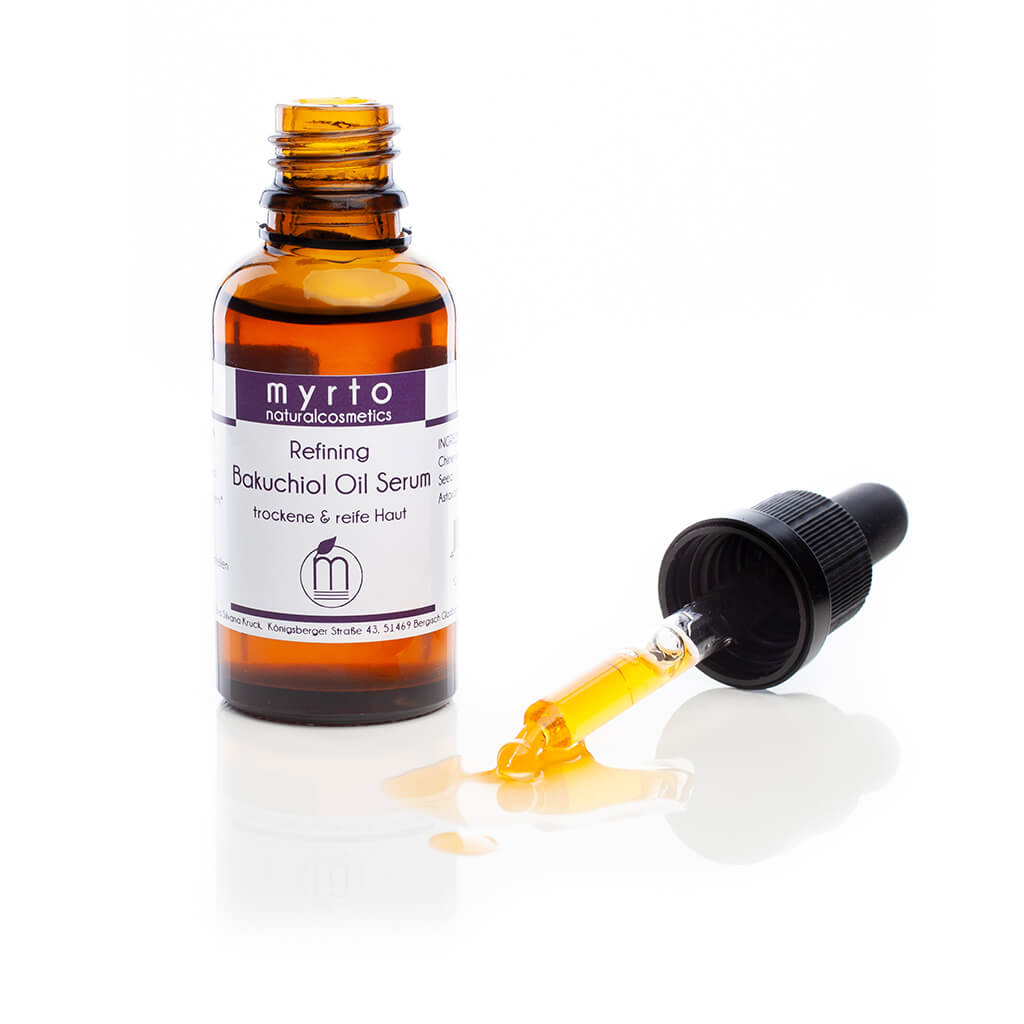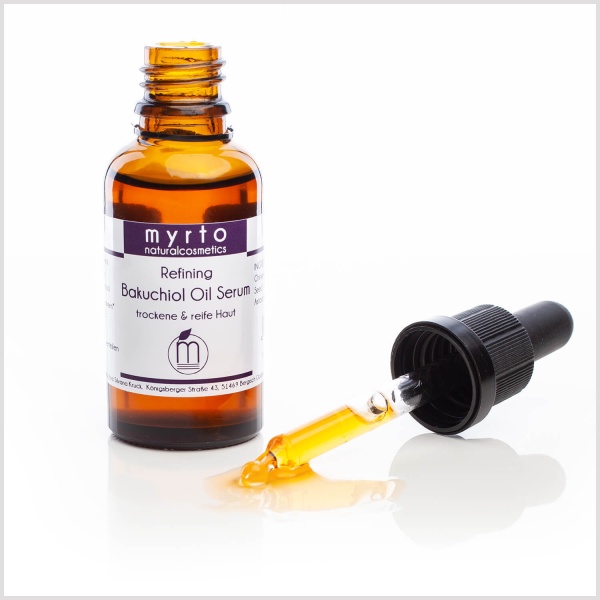If you are seaking an effective cosmetic solution for smoother skin, most likely retinol will be recommended to you. In this article you will learn how retinol works, what the unwanted side effects are and what bakuchiol as a purely herbal alternative makes preferable to retinol .
What is retinol and how does it work?
Retinol, also known as vitamin A, belongs to the group of retinoids. Natural retinol is contained in many foods as provitamin A. Fish, eggs, tomatoes, carrots or apricots, for example, contain plenty of retinol.
In cosmetics retinol is synthetically produced. It is preferably used in anti-aging serums or night creams. Its benefits have been proven in numerous studies. Retinol promotes the formation of new skin cells (corneocytes) and improves the regeneration of damaged skin. It stimulates the formation of collagen fibers for more elastic skin. Since retinol regulates cell functions, it can additionally be helpful with acne and counteract impure skin. Finally, retinol has the ability to lighten pigment spots and smooth the skin. However, this power ingredient does not only have advantages, which we will discuss in comparison between retinol and bakuchiol.
What is bakuchiol?
Bakuchiol (pronounced: "Ba-kutschi-ohl") is also a highly effective plant active ingredient against wrinkles that is still less well-known in Europe. Hyped as a new anti-aging trend, cosmetics experts regard bakuchiol as a superior, skin-friendly alternative to retinol.
In Indian Ayurveda as well as in traditional Chinese medicine, bakuchiol has been used for centuries as a remedy for numerous skin complaints such as inflammation, acne, wrinkles, pigment disorders or psoriasis. Bakuchiol is also becoming increasingly popular in modern natural cosmetics - for good reason: The purely vegan natural substance slows down skin aging, stimulates the formation of collagen fibers, tightens the tissue and helps build a healthy skin structure. Bakuchiol is considered a natural, skin-friendly alternative to the well-known anti-aging ingredient retinol.

How is bakuchiol obtained?
Bakuchiol is cold-pressed from the seeds and leaves of the babchi plant (botanical name: Psoralea Corylifolia) native to India, Sri Lanka and China. The purple flowering herb, also known as "Harzklee" in German, grows up to 1 meter high. It has a characteristically pleasant scent, grows mainly in dry areas and belongs to the legume family. The small black seeds of the Babchi plant are harvested up to 4 times a year in the winter months between December and March.
Bakuchiol and retinol in comparison
From a chemical point of view, synthetically produced retinol and plant-based bakuchiol are two completely different substances with completely different molecular structures. However, both active ingredients are very similar in their effect, as confirmed by several scientific studies. Both reduce wrinkles, are rich in antioxidants and stimulate the collagen formation. The main difference are nasty side effects of retinol and the risk of overdose.
According to a British comparative study (published in 2019 in the British Journal of Dermatology), cosmetics containing retinol often caused irritated, reddened and scaly skin, while this was hardly observed with bakuchiol. The BfR (Federal Institute for Risk Assessment) therefore warns against an overdose of retinol, which can accumulate in the body's fatty tissue and provoke liver damage. A legal limit for the inclusion of retinol in cosmetics is recommended. In addition to headaches, overdosed retinol can also cause reddened skin, scaling, dry, cracked skin, cracked lips or thinning hair and even hair loss.
Other possible side effects of retinol include fertility problems, as has been found in animal studies. Retinol is also potentially teratogenic during pregnancy and can lead to severe fetal malformations. According to the BfA, postmenopausal women have an increased risk of developing osteoporosis (bone loss) when using retinol cosmetics.
Retinol makes the skin hypersensitive to UV radiation and increases the risk of sunburn. Therefore, retinol is only suitable for night care. Strong UV protection is also necessary during the day. Bakuchiol, on the other hand, does not make the skin sensitive to light, but remains stable.
The effects of bakuchiol at a glance
Given retinol's serious disadvantages, we chose bakuchiol as a gentle and safe alternative with comparable effectiveness. Especially if you have sensitive and dry skin, we recommend the clearly better tolerated Bakuchiol. The most important advantages of this highly effective natural active ingredient for your skin are:
- Bakuchiol stimulates collagen formation
- reduces wrinkle depth, smoothes and tightens the skin
- improves skin firmness and skin elasticity
- gently lightens pigment spots
- counteracts cornification
- antioxidant: fights free radicals
- antimicrobial: inhibits inflammation, e.g. in blemished skin, acne and eczema
- also suitable during pregnancy and lactation
- suitable for all skin types, including sensitive, dry and sensitive combination skin
Bakuchiol used as a gentle booster ?
Bakuchiol is not only more skin-friendly than retinol, it is also less complicated to use. The mild natural active ingredient can be easily combined as a booster with other active ingredient serums, face creams and oils without irritating the skin. Since bakuchiol is light stable, it does not make the skin overly sensitive to the sun's UV rays. Bakuchiol is therefore not only suitable for use in the evening, but you can easily integrate it into your morning care routine. The concentration of bakuchiol in a cosmetic for sensitive skin should not be more than 0.5-1%.
Bakuchiol in our products
At myrto you will find 2 facial serums with bakuchiol:
The Refining Bakuchiol Oil Serum with 1% Bakuchiol counteracts the aging process gently but powerfully with proven effectiveness. The serum also contains plant-based squalane as a super-light basis and part of the skin's protective barrier layer. There are also organic grapeseed and jojoba oils, which strengthen the connective tissue, and astaxanthin for antioxidant cell protection.
In addition to 0.5% bakuchiol, the Brightening Vitamin Serum contains an effective combination of the important beauty vitamins niacinamide (vitamin B3), tocopherol (vitamin E) and ascorbyl glucoside (vitamin C) in moderate doses for sensitive skin. This gentle vitamin booster ensures even, well-hydrated and youthful skin with improved elasticity and a natural glow.



